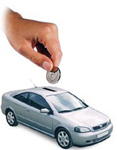
The cost of the car itself—typically the second biggest purchase many families make in their lives—is just the start. When you start adding in the cost of gasoline, and car insurance, and maintenance and repairs, and parking, and taxes to build new roads and maintain old ones, and license fees, and the medical costs of traffic accidents…boy, I could go on all day…Well, suffice it to say, the zeroes start adding up.
A while back I asked the estimable Yoram Bauman to wade through consumer spending figures to try to figure out how much we actually spend on cars in a year. Cutting to the chase…
In the Northwest states—Washington, Oregon, and Idaho—about 19 percent of all consumer spending goes towards transportation. A bit of that pays for planes, trains, and buses, but a whopping 95 percent pays for cars and related expenses.
Think of it this way. Open up your wallet, or check your bank balance, or look at your last paycheck. If you’re close to average, about one-fifth of all the money you see will go to pay for your car.
Or think of it this way—maybe you had a rough commute this morning, and spent 20 minutes in traffic. That’s frustrating. But consider this: for the first hour and a half you spend at work, you’re busy working to pay for your car. Which means that you’re spending more time “stuck in traffic” at the office than on the road.
If anything, Yoram’s estimates are conservative. They don’t include the cost of building your garage, if you have one; nor do they cover the cost of parking spaces that businesses build for your convenience. (Those costs show up in your mortgage and shopping bills.) Yoram’s figures also don’t include the cost of any taxes that are paid to secure your fuel supply; those mostly show up as taxes on income or capital gains. And they certainly don’t cover the external costs of climate change; of air, water, and noise pollution; or of the pain and suffering caused by car accidents.
The really interesting thing to me about all this, though, is the comparison with British Columbia. BC residents spend only about 14 percent of their income on transportation, including about 12 percent that’s spent on cars. (In terms of daily work time, BC residents spend about a half-hour less each day “stuck in traffic,” paying for cars, gas, and the like.)
There’s no one reason for BC’s advantage. Part of it is that cars in Canada have historically cost more than in the US (exchange rates, and all that)—which means that people buy fewer of them. In the Northwest US, there are more cars than drivers.
But at least some part of the explanation is that BC cities (and Canadian cities generally) are laid out so that people can get by without driving so much. And that means that people don’t need to spend so much to get around—so even though cars and gas are more expensive, they BC residents spend less on them, person for person, than we do.









Arie v.
You had me at 19% :). As a rural to urban area commuter this makes me skirm. Even though I have a short commute come $10 gallon gas prices there will yet be no alternative out here. This makes me think back to my days in Japan where car travel was not a necessity for millions who live within walking or biking distance of a station. Even in rural or suburban areas they allow small convenience stores, living room barber shops and such to allow small errands close proximity. If we think big and start to plan to transition away from car travel Vancouver as just a baby step. I would look to New York, London, Japan and other more dramatic examples as volatility in oil prices or other trends may bring change more rapidly than we expect. I doubt we’re ready in King County or other areas to adapt quickly to rapid changes. The small shop and other zoning accomodations I see in Europe or Asia are anathema to planners here. Great post, but it makes me contemplate that we may be less ready for change than we realize.
a-kos
To any thinking person this is no surprise. Simply owning a car (even assuming you never drive it) will cost a minimum of about $120 per month: about $100 for insurance + $20 for various taxes/vehicle fees.And this is a very conservative estimate. In Seattle, realistically it will cost at least $200/month for insurance, parking and taxes/fees. Think about that… $200 per month to own a car before you even start the ignition.
Michael
19 percent of consumer spending on transportation in the US isn’t the number that knocks my socks off—it’s the 12 percent of transportation spending on cars in BC.